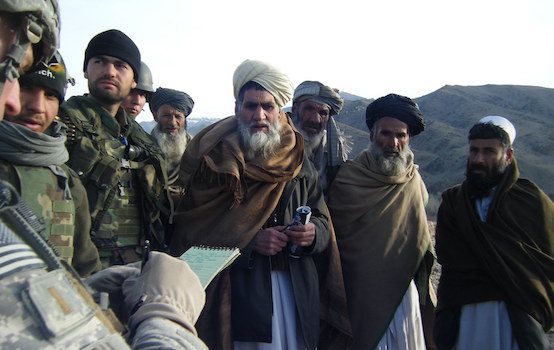The Blob Lashes Out At Critics of Endless War

America has pursued the same foreign policy for almost two decades, and the results aren’t good. In Afghanistan, for example, the Taliban controls the same area of land it held a decade ago. By most metrics, things are getting worse, and there is no end in sight. But instead of admitting its failure and changing course, Washington’s foreign policy establishment insists there is no option but the status quo—and then demands its critics do the impossible: predict the future.
The latest example of this occurred when Kevin Baron, executive editor of The Atlantic’s Defense One, penned an op-ed titled “‘End forever wars’ is a soundbite, not a security policy.”
Baron criticizes those who point out how long we’ve been in Afghanistan, and who point out the lack of progress on the ground. He says that, instead, we should ask ourselves whether Afghanistan is making America safer.
Baron then lists the countries and regions where America is now intervening, asking critics of these permanent wars to prove terror won’t thrive once we leave. Absent that impossible accomplishment, he—like the rest of Washington’s foreign policy “blob”—won’t countenance U.S. departure.
Some policymakers and pundits no doubt have vague foreign policy plans. And after three successive presidents campaigned on less interventionist foreign policies only to (so far) under-deliver while in office, there should be much doubt from anyone promising to radically change course if they were to win in 2020. But the foreign policy establishment is wrong to think ending forever wars isn’t a security policy. It is exactly that.
In demanding more specifics, Baron unintentionally makes the case for abandoning the foreign policy status quo. The many countries in which the U.S. military is intervening—Somalia, Yemen, Syria, Iraq, Afghanistan, and dozens of troubled countries in Africa—are all incredibly complex. It is admittedly not possible to know exactly what would happen after an American exit, especially in the long term. But by that very token, this complexity is why Washington cannot bend these troubled regions to its will.
What’s more, these forever wars are not strategically important to America’s security. Baron points out that Al-Qaeda operated from Afghanistan to hit America on 9/11. But we have plenty of options that don’t entail occupation and nation building to keep Al-Qaeda from again having a safe-haven. And Al-Qaeda is already operating in other areas alongside supposed U.S. partners—including Saudi Arabia, which has had ties with Al-Qaeda in Syria and Yemen’s civil wars.
Often, the turmoil created because of our interventions opens a space for Al-Qaeda or Islamic State to operate in—Libya, Syria, and Iraq provide perfect examples.
And because of the complexity of the Middle East—and the limits of our military, which is intended to destroy, not build—there is a very real risk that American intervention and nation building is making things worse, not better. Washington may be unwittingly stunting the growth of a moderate Islamic movement, which is the only real long-term solution to Islamic extremism.
Meanwhile, intervention too often aligns the U.S. with bad actors. In Syria, American special forces were ordered to train fighters suspected of being jihadists. The program was completely ineffectual for advancing U.S. interests, but cost American taxpayers $1 billion per year.
That’s not the only questionable partnership that reckless interventionism has produced: When the Sunni Islamic State emerged, America found itself coordinating with Shia Iran. In Afghanistan, there is a widespread practice of “bacha bazi,” the sexual abuse of young boys, by certain Afghan warlords, police, and military—who are often protected, supported, and funded by our government. American soldiers are horrified by the practice, but have been told by their superiors to ignore the abuse—after all, the warlords are “allies” against the Taliban.
This problem was exposed in 2015, when several of the abused young boys obtained guns and started shooting their abusers as well as American servicemembers. It is indefensible for Washington to put our soldiers in this position. The problem is still ongoing today, as evidenced by a 2018 report released by the Trump administration that the Obama administration had sought to hide until 2042—though there is little indication the situation has changed under the Trump administration.
That Washington continues to put our soldiers in these situations is immoral. We don’t have to choose between arming potential jihadists and Bashar al-Assad. We don’t have to take a side in the centuries-long Sunni-Shia rivalry. We don’t have to choose between warlords who keep child sex slaves and the Taliban (who criminalized the practice). There is a third choice: drastically recalibrate U.S.-Middle East policy and reduce our ground presence.
The risk of oversimplifying is real. But that is no argument for prolonging forever war. Instead of trying to make sense out of chaos, instead of futile attempts to bend a complex system to our will, the best policy is to force the region to sort out its own problems, while U.S. military power focuses on keeping Americans safe. At this point, the burden of proof falls on the Washington establishment to show why the status quo is working. That too is an impossible task.
Willis L. Krumholz is a fellow at Defense Priorities. He holds a JD and MBA degree from the University of St. Thomas, and works in the financial services industry.
Comments